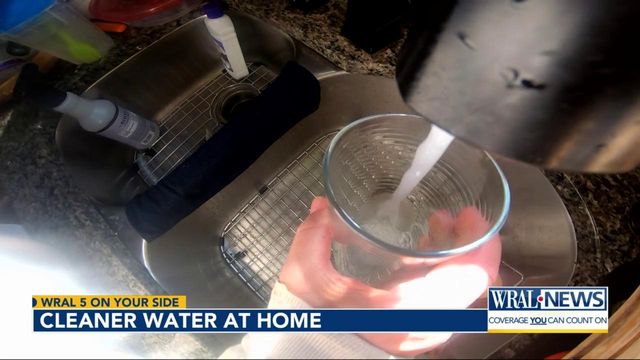5 On Your Side: Finding the best water filter for your home
WRAL found forever chemicals in drinking water in Raleigh, Cary and Durham, with the highest levels in Cumberland County and Burlington.
The Environmental Protection Agency (EPA) is working on setting new limits for these chemicals, also known as per- and polyfluoroalkyl substances (PFAS). They're called forever chemicals because of how long PFAS can persist in the environment and the human body.
Studies have linked some PFAS to adverse health effects, including cancer. The EPA has said exposure to very low levels of some forever chemicals can be harmful and has proposed limits on six types of PFAS, but there are no current regulations for utilities.
5 On Your Side spoke with an expert about how to filter contaminates out of your drinking water.
Water testing
It doesn’t matter where you’re getting your water from — there are plenty of options to filter specific contaminants out before your family drinks it; you just have to know how to find the right filter.
"I don’t think many people know how much could be in their water," explained Keith Flamer with Consumer Reports.
Flamer said the first step is getting your water tested or reviewing testing that’s already been done.
"Every year there’s a report that comes out, it’s called the Consumer Confidence Report, the CCR, and everyone should have access to it through their utility company," Flamer said.
That will give you a picture of what is in the water everyone in your community uses.
If you want to test the water specifically at your house, there are several companies that will do that for a cost.
Flamer mentioned Cyclopure, Watercheck and Tap Score as options to have your water tested.
Certified filters
"Once you know what’s in your water, and what you want to filter out, then specifically go for that type of filter that filters those specific contaminants," Flamer said.
A great way to do that is to look on the National Sanitation Foundation’s website.
The foundation certifies filters that meet their standards for drinking water, allowing users to search for filters that remove contaminants specific to the water in your home.
Flamer said, if you’re buying a filter without consulting the NSF website, it’s very important to look at the language on the filter’s packaging.
"A lot of them will say we are tested to the NSF Standard, but it doesn’t say certified by the NSF," Flamer said. "Look for that ‘certified by,’ that means it’s been continually tested over time."
Filter devices
There are other factors to consider when picking out a water filter for your home.
One of the most effective filtration devices is reverse osmosis. Flamer says it works very well, but it does have drawbacks.
"Sometimes they’ll waste 3-to-20 times as much water as clean water you’re getting," Flamer explained.
Other filtration devices include activated carbon filters, ion exchange units and distillation units.
Filter systems
Filter systems come in several different sizes.
Simple setups are systems like a water filter pitcher or the filter that goes in your refrigerator’s water dispenser. Those are typically the most cost effective.
The next step up are filter systems that attach to a faucet. These typically require installation by a plumber and the cost varies depending on their complexity.
A whole-house filter is the most expensive option, but it treats all water entering your house.
The CDC has a helpful breakdown of filter devices, systems and their pros and cons.
There are thousands of different filters to chose from and a good one can do a lot of good to improve the quality of water your family is drinking. But, as Flamer cautioned, "nothing totally removes all the bad things out of your water."












